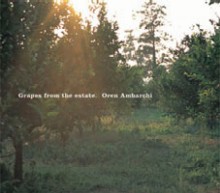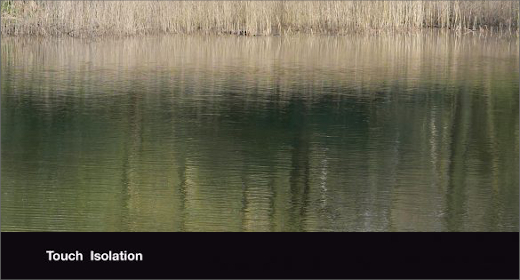
I’ve been following the solo work of this Australian guitarist for a few
years now, and am enjoying each release more and more. His music
inhabits an area of slowly developing, languid guitar-based electronic
compositions which bears comparison to other releases on Touch by the
likes of Rafael Toral and Fennesz. Whether they share influences,
there’s also a certain similarity with later Seefeel releases, where
Mark Clifford sounded bent on reproducing the moods of Aphex
Twin’s Selected Ambient Works II (Warp) with a guitar as his starting
point. These more ambient explorations culminated with the album Ch-
Vox (Rephlex), but while that had a cold and brittle sound, Oren
Ambarchi’s work is notable for being both calming and inviting.
Ambarchi’s last solo release, Suspension (Touch), involved long, deep
tones punctuated by dull pops and shifts as repeating samples abruptly
cut off and start again in overlapping phrases. Slowed and elongated
sounds may no longer bear much, or any, resemblance to guitar. Maybe a
better point of comparison is with less noisy Oval tracks. With Grapes
from the Estate Ambarchi has introduced a wider variety of sounds and
also given the pieces of music even more time to develop. So we find
four long tracks, with the Suspension style tones and drones, mixed
with piano, chimes, soft brush-played drumming, and, perhaps most
surprisingly, unobscured guitar chords.
The album warms up with “Corkscrew,” which is in the older style, and
serves as a leader into the more diverse sounds of “Girl with the Silver
Eyes.” This second track opens with a series of abrupt tones that click
in and out of existence. Softer bass sounds are introduced to
complement these, followed by muted drumming. Where others might have
introduced a clear rhythm, Ambarchi allows the drums to serve as
texture, using artificially extended cymbals as gentle punctuation. The
chiming strum of a guitar slowly takes prominence, shifting in speed,
pitch and stereo space as the track progresses, reminiscent of the more
free experimentation of his first solo album.

“Remedios the Beauty” starts with clusters of looping notes, which are
allowed to quietly rub against each other slowly shifting phrases,
before suddenly being pared back to a repeating bass pattern. From here
the track builds back up with the muted ringing of bells and bowls,
before being joined by distant strings and finally settling into a
repeating series of chords played on acoustic guitar and piano. This is
by far the most conventional piece of music I’ve heard from Ambarchi
solo, sounding something like a slow instrumental passage from his “pop”
band Sun as a swung drum part is introduced, but still underpinned by
his trademark processed guitar loops. To give you an idea of scale,
this one clocks in at a mere quarter of an hour in length.
The album closes with “Stars Aligned, Webs Spun,” a 20 minute track that
returns to the slow build of electric guitar tones. It’s the kind of
track which those who never enjoyed ambient music may dismiss,
saying “nothing happens,” but attentive listening reveals many details
as very quiet tremelo playing augments the more heavily processed
sounds. There is an extremely delicate interplay between the soft
higher chords and the sometimes quavering and shuddering bass notes,
which reminds me of what separates ambience from new age – the hints of
disquiet stop the over all effect from being cloying.
When writing reviews I try to steer well clear of gushing, because I
know when I read a review I really just want to know what something
sounds like and get a little context, so I can assess for myself whether
I want to check it out. The risk is obviously that people are left only
with clinical descriptions that may make an album sound boring. So I
should stress that after repeat listens Grapes from the Estate has
really sunk its hook into my brain and I find it very moving. If you
enjoy any of the music I’ve referred to in this review, I would
thoroughly recommend you take the time to check this release out.
Grapes from the Estate is out now on Touch.
















![Luke’s Anger :: Ceiling Walker EP (Love Love) — [concise]](https://igloomag.com/wp/wp-content/uploads/2025/04/lukes-anger-ceiling-walker-vinyl_feat-75x75.jpg)

![Ndorfik & madebyitself :: Solos EP (People Can Listen) — [concise]](https://igloomag.com/wp/wp-content/uploads/2025/04/ndorfik-madebyitself-solos_feat-75x75.jpg)




